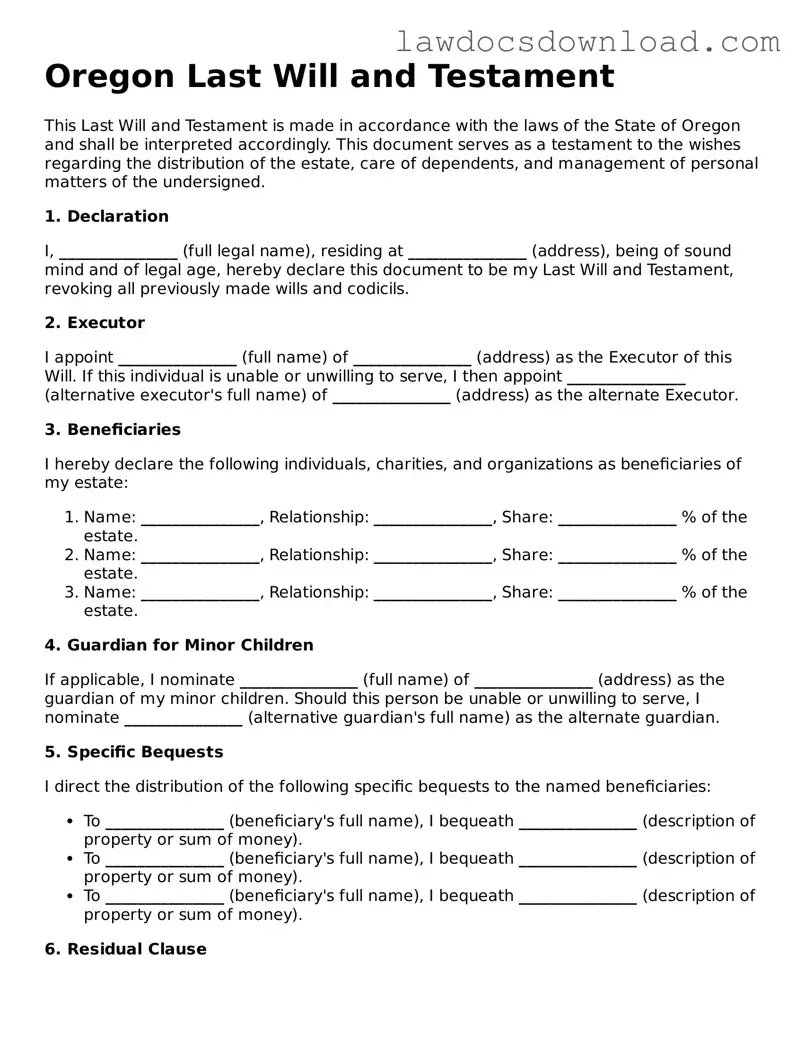Oregon Last Will and Testament
This Last Will and Testament is made in accordance with the laws of the State of Oregon and shall be interpreted accordingly. This document serves as a testament to the wishes regarding the distribution of the estate, care of dependents, and management of personal matters of the undersigned.
1. Declaration
I, _______________ (full legal name), residing at _______________ (address), being of sound mind and of legal age, hereby declare this document to be my Last Will and Testament, revoking all previously made wills and codicils.
2. Executor
I appoint _______________ (full name) of _______________ (address) as the Executor of this Will. If this individual is unable or unwilling to serve, I then appoint _______________ (alternative executor's full name) of _______________ (address) as the alternate Executor.
3. Beneficiaries
I hereby declare the following individuals, charities, and organizations as beneficiaries of my estate:
- Name: _______________, Relationship: _______________, Share: _______________ % of the estate.
- Name: _______________, Relationship: _______________, Share: _______________ % of the estate.
- Name: _______________, Relationship: _______________, Share: _______________ % of the estate.
4. Guardian for Minor Children
If applicable, I nominate _______________ (full name) of _______________ (address) as the guardian of my minor children. Should this person be unable or unwilling to serve, I nominate _______________ (alternative guardian's full name) as the alternate guardian.
5. Specific Bequests
I direct the distribution of the following specific bequests to the named beneficiaries:
- To _______________ (beneficiary's full name), I bequeath _______________ (description of property or sum of money).
- To _______________ (beneficiary's full name), I bequeath _______________ (description of property or sum of money).
- To _______________ (beneficiary's full name), I bequeath _______________ (description of property or sum of money).
6. Residual Clause
All remaining assets of my estate, after payment of debts and specific bequests, shall be distributed to the following beneficiaries:
- Name: _______________, Share: _______________ %.
- Name: _______________, Share: _______________ %.
7. Signature
This document, my Last Will and Testament, was signed on _______________ (date), at _______________ (location), in the presence of two witnesses, who also signed this Will in my presence and in the presence of each other.
______________________
Signature of Testator/Testatrix
Witness #1: _______________ (full name)
Address: _______________
Signature: ______________________
Witness #2: _______________ (full name)
Address: _______________
Signature: ______________________
8. Notary
In some cases, notarization may be advisable to further authenticate this document. However, it is not strictly required under Oregon law for the validity of a Last Will and Testament.
IN WITNESS WHEREOF, a notary public may authenticate the signatures hereon.

